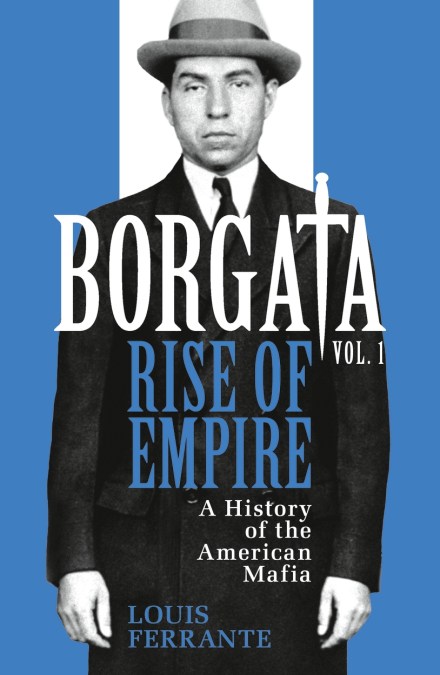Borgata: Rise of Empire
The American mafia has long held powerful sway over our collective cultural imagination. But how many of us truly understand how a clandestine Sicilian criminal organisation came to exert its influence over nearly every level of American society?
In BORGATA: RISE OF EMPIRE, former mafia member Louis Ferrante pulls back the curtain on the criminal organisation that transformed America. From the potent political cauldron of nineteenth-century Sicily to American cities such as New Orleans, New York and the gangster’s paradise of Las Vegas, Ferrante traces the social, economic and political forces that powered the mafia’s unstoppable rise. We follow the early mob as they provide alcohol to the American public during prohibition, aid U. S. Naval Intelligence during the Second World War, establish a gambling mecca in the Nevada desert – and unofficially take control of the island of Cuba.
Ferrante’s vivid portrayal of early American mobsters – among them Lucky Luciano, Vito Genovese, Frank Costello and Meyer Lansky – fills in crucial gaps of mafia history to deliver the most comprehensive account yet of the world’s most famous criminal fraternity.
This volume is the first in a groundbreaking new trilogy from a man who has seen it all from the inside. Ferrante’s masterful account journeys from the group’s inauspicious beginnings to the height of their power as the most influential organised criminal network in America.
In BORGATA: RISE OF EMPIRE, former mafia member Louis Ferrante pulls back the curtain on the criminal organisation that transformed America. From the potent political cauldron of nineteenth-century Sicily to American cities such as New Orleans, New York and the gangster’s paradise of Las Vegas, Ferrante traces the social, economic and political forces that powered the mafia’s unstoppable rise. We follow the early mob as they provide alcohol to the American public during prohibition, aid U. S. Naval Intelligence during the Second World War, establish a gambling mecca in the Nevada desert – and unofficially take control of the island of Cuba.
Ferrante’s vivid portrayal of early American mobsters – among them Lucky Luciano, Vito Genovese, Frank Costello and Meyer Lansky – fills in crucial gaps of mafia history to deliver the most comprehensive account yet of the world’s most famous criminal fraternity.
This volume is the first in a groundbreaking new trilogy from a man who has seen it all from the inside. Ferrante’s masterful account journeys from the group’s inauspicious beginnings to the height of their power as the most influential organised criminal network in America.
Newsletter Signup
By clicking ‘Sign Up,’ I acknowledge that I have read and agree to Hachette Book Group’s Privacy Policy and Terms of Use
Reviews
Highly entertaining
A fascinating first volume . . . smoothly written and impeccably researched . . . a serious historical look at organized crime written not by an academician or a journalist, but someone who lived the life. His insights are often personal and always informative . . . It's more complex, erudite and compelling than anything you'll hear on a podcast
A compelling narrative explaining the socio-economic conditions that spawned the mafia. It will not and cannot be ignored
He may be a loss to the criminal fraternity, he is most certainly an asset to the literary world
Building his case in concise, economical prose, Ferrante draws on an extensive knowledge of world events, mob lore and personal experience . . . a rousing memoir, meditation on world history and Mafia exposé all in one
Being inside Ferrante's mind is an amazing experience
It's very rare when someone from Lou's world has the heart of a writer. Criminal experiences don't usually lead to great insights. Louis Ferrante is different - his talent for storytelling shines through
A fascinating inside look at the history of the Mafia . . . Ferrante's familiarity with Mafia customs gives flesh and immediacy to what could otherwise be a rote historical tome, but he doesn't draw his authority from affiliation alone: this is a well-researched history in its own right. True crime fans will be captivated
How the Italian mafia went global

